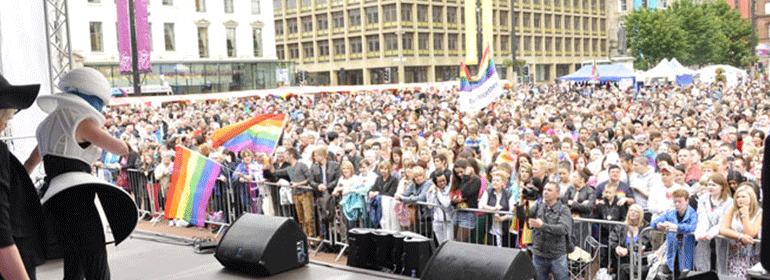Were Free Pride Glasgow organisers right in banning drag performers from this year’s festival, so as not to offend trans people, asks Brian O’Flynn?
This week, the Free Pride Glasgow organisers announced their decision not to invite any drag performers to this year’s festival. The press release explains that “It was felt by the group within the Trans/Non Binary Caucus that some drag performance, particularly cis drag, hinges on the social view of gender and making it into a joke, however transgender individuals do not feel as though their gender identity is a joke.”
Despite the heartfelt and carefully worded explanation, the announcement was met with some rancour in the LGBT community. Perhaps the most notable dissenter was international drag star Panti Bliss, who described it as “a load of nonsense” on her Facebook account yesterday.
For me, this news story marks just another small battle in an ideological war that has been waging for some time; a battle between those whom the media have dubbed “the liberal thought police”, and those who claim to support “freedom of expression” under all circumstances.
The battleground I’m referring to seems to have no clear divisions. Even the most homogenous groups of people whose views align across the board on same-sex marriage, abortion, etc. seem to fracture and curdle in the face of this issue. The questions at the heart of the debate are subtle ones; questions of where to draw the line, and how far is too far, and how sensitive is too sensitive?

The sphere of gender certainly seems to attract a lot of this controversy. Fans of Drag Race will recall the vitriolic spat between trans contestant Carmen Carrera and the queen herself, RuPaul. Carmen criticised RuPaul for allowing the use of the allegedly transphobic term “she-male” on the show. RuPaul asserted that the term was not transphobic and went as far as to say that people need to “get stronger” if they find such things offensive.
This is a perfect example of just how nuanced and complex these issues are. Here we have an icon of the LGBT community, who has normalised the subversion of gender roles and thus massively helped the trans movement, being accused of transphobia. It seems ludicrous. But at the same time, any trans ally will recognise the importance of listening to the community’s concerns. If trans people find this term offensive, is it really our place to contradict them? After all, it is they who have had to struggle against anti-trans prejudice their entire lives.
I see many similarities between this example and the Free Pride controversy. It seems profoundly wrong not to invite drag performers to pride. They have made gender bending mainstream and thus helped queer people to become more accepted. Furthermore, the whole purpose of pride is surely to celebrate all forms of gender expression? It seems severely reductionist to dismiss cis drag as “a joke”.
But again we come up against the issue of representation. Shouldn’t we be listening to the opinions of trans representatives? Or is it really fair to say that they’re being “over-sensitive?”
This growing phenomenon of so-called “over-sensitivity” has not gone unnoticed by mainstream media. The trend extends far beyond the niche world of drag. Universities all over the world have come under fire in recent years for caving in to “over-sensitive” students and “censoring” undesirable opinions. A Guardian article published this February highlighted that some universities have gone as far as to ban sombreros because they are racist. Similarly, there was uproar earlier this year when the NUS passed a motion banning gay men from “acting like black women”.
To some, these motions can all be lumped together under one banner; political correctness gone mad. But for a growing number of students, these changes are simply progress. It seems that in an age of internet, every little subtlety can now be considered. Many activists spend countless hours in online communities debating the most minute issues and sharing their experiences as minorities. In a time when we confine ourselves more and more to social media, it seems focus is shifting away from intentions and towards implications. It is no longer acceptable to just do; we are now compelled to consider the consequences of every action on every person it may potentially affect.
Is this really a bad thing? Couldn’t it good that we are refining our morals and culture, and distilling them into the most perfect form? Wasn’t it inevitable, given the way our society is developing (more education, more access to information, less real world interaction), that this would happen?
Or is this “progress” actually regression? In our attempts to ensure that everybody is considered, have we actually begun to hurt ourselves? After all, it seems pretty counter-intuitive that in order to preserve a safe-space for trans people at Free Pride, the organisers have had to alienate another group of people. Are they striving for a perfection they can’t attain?
At the end of the day, I believe that the organisers of Free Pride had everyone’s best intentions at heart. If you read their statement, I’m sure you’ll see that they are agonising over this decision. However, as Panti Bliss argued, only a “tiny number” of trans people actually support this move. If that’s true, then this ruckus may all have been in vain.
One thing is certain; this skirmish is a symptom of a much larger divide in the LGBT community and beyond. Is constantly moderating our thoughts and actions to limit potential harm the only way to be moral? Or is there an epidemic of over-sensitivity that needs to be addressed?
© 2015 GCN (Gay Community News). All rights reserved.
